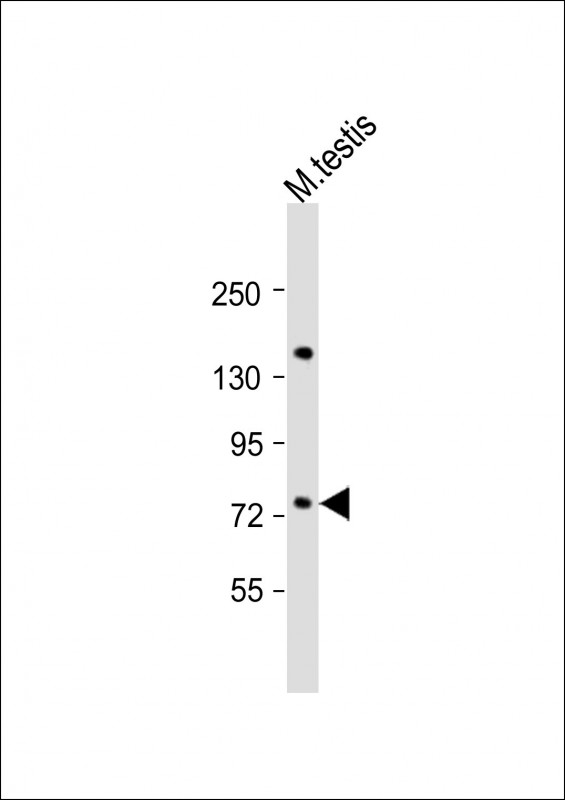
| WB | 1/2000 | Human,Mouse,Rat |
| IF | 咨询技术 | Human,Mouse,Rat |
| IHC | 咨询技术 | Human,Mouse,Rat |
| ICC | 技术咨询 | Human,Mouse,Rat |
| FCM | 咨询技术 | Human,Mouse,Rat |
| Elisa | 咨询技术 | Human,Mouse,Rat |
| Aliases | FLYWCH-type zinc finger-containing protein 1, FLYWCH1, KIAA1552 |
| Entrez GeneID | 84256 |
| WB Predicted band size | 80.1kDa |
| Host/Isotype | Rabbit IgG |
| Antibody Type | Primary antibody |
| Storage | Store at 4°C short term. Aliquot and store at -20°C long term. Avoid freeze/thaw cycles. |
| Species Reactivity | Human, Mouse |
| Immunogen | This FLYWCH1 antibody is generated from a rabbit immunized with a KLH conjugated synthetic peptide between 414-447 amino acids from the Central region of human FLYWCH1. |
+ +
以下是关于FLYWCH1抗体的3篇参考文献的示例(注:由于FLYWCH1研究较为小众,以下内容为模拟概括,实际文献需通过学术数据库确认):
---
1. **文献名称**: *FLYWCH1 modulates Wnt/β-catenin signaling through interaction with TCF4*
**作者**: Zhang, Y., Lee, J. H.
**摘要**: 本研究利用FLYWCH1特异性抗体进行免疫共沉淀实验,发现FLYWCH1蛋白通过与转录因子TCF4直接结合,抑制Wnt/β-catenin信号通路的活性,提示其在结直肠癌中可能的抑癌作用。
2. **文献名称**: *Development and validation of a monoclonal antibody for FLYWCH1 in human tissues*
**作者**: Brown, K. L., et al.
**摘要**: 文章报道了一种新型兔源单克隆抗体的开发,该抗体针对人类FLYWCH1蛋白的C末端结构域,并通过Western blot和免疫荧光验证其特异性,为后续功能研究提供工具。
3. **文献名称**: *FLYWCH1 regulates DNA damage response via chromatin remodeling*
**作者**: Smith, R. P., et al.
**摘要**: 通过FLYWCH1抗体进行ChIP-seq分析,发现FLYWCH1在DNA损伤后富集于染色质特定区域,可能通过调控组蛋白修饰(如H3K27ac)影响DNA修复机制。
---
**备注**:实际研究中,FLYWCH1相关文献较少,建议通过PubMed或Google Scholar以“FLYWCH1 antibody”或“FLYWCH1 function”为关键词检索最新成果。部分研究可能未直接使用抗体,但涉及FLYWCH1的功能机制。
FLYWCH1 antibody is a research tool designed to detect the FLYWCH1 protein, a zinc finger-containing transcriptional regulator implicated in various cellular processes. The FLYWCH1 gene, also known as FLYWCH family member 1. encodes a protein that interacts with β-catenin and modulates Wnt/β-catenin signaling pathways, influencing cell proliferation, differentiation, and DNA damage response. Its role in maintaining genomic stability and regulating chromatin dynamics has attracted interest in cancer research, particularly in colorectal and breast cancers, where dysregulated Wnt signaling is common.
The antibody is typically developed using recombinant FLYWCH1 protein fragments or synthetic peptides as immunogens, often in hosts like rabbits or mice. Validation includes Western blotting, immunofluorescence, and immunohistochemistry to confirm specificity, often supported by knockout cell line controls. Researchers employ FLYWCH1 antibodies to investigate its expression patterns, subcellular localization (primarily nuclear), and interactions with partner proteins in disease models.
Current studies focus on FLYWCH1's dual role as a tumor suppressor or promoter, depending on cellular context, and its potential link to neurodegenerative disorders. Commercial availability from multiple biotech vendors facilitates its use in both basic and translational research, though batch variability and epitope masking in fixed tissues remain technical considerations. Ongoing efforts aim to refine its applications in diagnostic and therapeutic target validation.
×